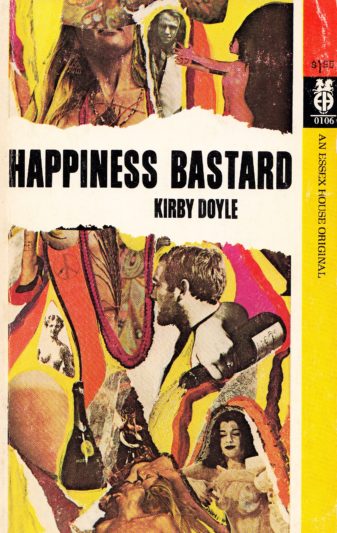 By KIRBY DOYLE (Essex House; 1968)
By KIRBY DOYLE (Essex House; 1968)
The only published novel by the famous beat poet Kirby Doyle (1932-2003), HAPPINESS BASTARD was composed on a continuous teletype scroll of paper (a la ON THE ROAD) in 1959-60. For whatever reason, its eventual publication didn’t occur until 1968, courtesy of the upscale smut book outfit Essex House. The Doyle-Essex pairing wasn’t nearly as incongruous as it might seem, as Essex House put out quite a few novels by poets (specifically David Meltzer and Michael Perkins), and also a book by Doyle’s fellow beatnik refugee Charles Bukowski (NOTES OF A DIRTY OLD MAN)—and furthermore, the content of HAPPINESS BASTARD is notably sexual and grotesque, to a degree that seems very Essex House-friendly.
According to poet Michael McClure, HAPPINESS BASTARD’S original manuscript was “the most grotesque and hilarious novel I’d ever seen,” but was apparently “butchered” by its publisher. What the extent of the butchery might have been I have no idea, but grotesque and hilarious are definitely adjectives I’d assign to the text in its present form.
Its overriding narrative is quite simple: a harried poet named Tully McSwine, a thinly-veiled autobiographical stand-in for Kirby Doyle, spends a hectic day in NYC’s lower east side with his girlfriend Dolly and various other eccentric characters—all explicitly patterned after various real people in Doyle’s life—before bottoming out at a raucous party. All this is viewed through a dreamy stream-of-consciousness haze whose true source is evident in an early line about a “junkie’s vein.” Beyond that the descriptions of drug use are surprisingly scant (a result of the “butchering” the book underwent?), but the specter of illegal substance abuse definitely overhangs the proceedings—as, perhaps, does the encroaching insanity that would overtake Doyle in his final years.
The author’s poetry is interwoven into the book–including a piece entitled “Ode to John Garfield”—and, given the slipstreamy nature of the prose, doesn’t feel at all out of place. Also present is the author’s love of 19th Century romanticism, which is evident in the absurdly flowery verbiage employed in detailing an extended bathtub tryst (“Having made my deposits into the orifice of my loved one I sink to the stale bottoms of reverie”), as well as a great deal of unapologetic scatology (in a climactic description of a woman taking a dump) and some rudimentary surrealism (in a passage in which a cop literally melts before McSwine’s eyes).
What’s perhaps most notable about the book is its tone, which as the title portends is sunny and upbeat. That may explain why the novel is as compelling as it is despite its plotless and uneven nature. I wouldn’t call it “good,” but I do believe that, butchered or not, HAPPINESS BASTARD should have had a much greater impact on the literary scene of the late sixties than it did.
